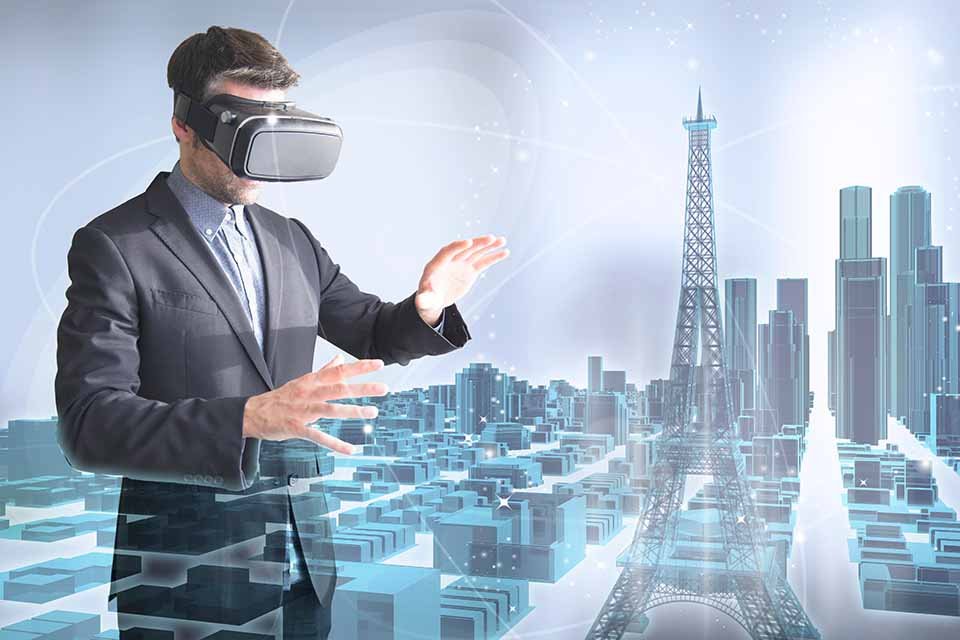Introduction
Over the past few decades, the world of travel has undergone a remarkable transformation. Technological advancements have revolutionized the way we explore destinations, bridging gaps and creating more accessible and efficient travel experiences. From virtual reality tours and online booking platforms to advanced navigation systems and AI-driven customer support, technology has become an indispensable part of the travel industry.
Understanding these shifts is crucial for travelers, businesses, and industry professionals alike. The impact of technology on travel not only enhances convenience but also enriches the overall experience. The ability to book flights and accommodations from the comfort of our homes, access real-time information about destinations, and even navigate foreign cities with ease are just a few of the innovations driving this change.
This article delves into the key technological innovations shaping contemporary travel. We will explore how mobile applications, online communities, and automated services are changing the face of travel. Additionally, we will examine how data analytics and artificial intelligence are paving the way for more personalized and efficient travel experiences.
As we embark on this journey through the evolution of travel, it becomes evident that technology is not just a facilitator but a game-changer in how we perceive and undertake journeys. By embracing these advancements, we can look forward to a future where travel is more seamless, informed, and enjoyable. Welcome to the captivating world of tech-enhanced travel.
Online Booking Platforms
In recent years, the landscape of travel has undergone a dramatic transformation, largely due to the advent of online booking platforms. These platforms have revolutionized the way travelers plan and execute their journeys, moving away from the dependence on traditional travel agencies. Now, with just a few clicks, individuals can book flights, accommodations, tours, and activities from the comfort of their own devices, providing a level of convenience and flexibility hitherto unseen.
One of the key advantages of online booking platforms is the efficiency they bring to the table. Gone are the days of lengthy phone calls and visits to travel agencies. Now, travelers can instantly compare prices, read reviews, and choose from a plethora of options suited to their preferences and budget. This speed not only saves time but also enhances the overall travel experience, as individuals can make informed decisions rapidly and effortlessly.
Beyond mere efficiency, these platforms offer travelers unprecedented control over their itineraries. Users can curate their travel plans down to the finest detail, from selecting ideal flight timings to customizing their lodging and activities to align with personal interests and needs. This ability to personalize travel experiences ensures that a voyage is not just another trip but a journey uniquely tailored to each explorer.
Moreover, online booking platforms often amalgamate various services, creating a seamless one-stop-shop for travelers. Whether seeking last-minute deals, exclusive packages, or even travel insurance, these robust platforms cater to diverse travel requirements, fostering a more cohesive and stress-free planning process. The integration of real-time updates and customer support further augments their usability, making them indispensable tools for modern-day explorers.
Ultimately, the shift from traditional travel agencies to online booking platforms epitomizes the intersection of technology and travel. It is a testament to how digital tools have reshaped our world, granting us more autonomy, efficiency, and enjoyment in our travel endeavors.
Mobile Applications
Mobile applications have fundamentally transformed the travel experience, providing essential tools that simplify and enhance various aspects of the journey. One of the most significant advancements is the development of navigation apps. These applications, exemplified by Google Maps and Waze, offer real-time directions, traffic updates, and points of interest, ensuring travelers can find their way with ease. The convenience of having such powerful navigation tools in the palm of one’s hand cannot be overstated, reducing the likelihood of getting lost and optimizing travel routes.
Language translation apps are another vital resource, breaking down communication barriers for travelers in foreign countries. Applications like Google Translate and Babbel enable users to translate text, speech, and even images in real-time. This capability is invaluable in situations where immediate understanding is crucial, such as reading signs, conversing with locals, or navigating menus in restaurants. These apps not only facilitate communication but also enrich the cultural exchange, making travel more accessible and enjoyable.
Additionally, currency converter apps play a crucial role in managing finances abroad. Travelers can use apps like XE Currency and Currency Converter Plus to get real-time exchange rates and convert currencies on the go. Such apps help travelers budget more effectively and avoid the pitfalls of fluctuating exchange rates, ensuring that they are always aware of the financial implications of their spending.
Travel planning tools, like TripIt and Google Trips, allow travelers to organize their itineraries, book accommodations, and track reservations in one centralized location. These applications synchronize with the user’s email, aggregating flight details, hotel bookings, and rental car information into a cohesive agenda. This level of organization mitigates the stress of travel planning and ensures that all critical information is readily accessible at any point during the journey.
In essence, mobile applications have revolutionized the travel industry, offering a suite of tools that address common challenges and enhance the overall travel experience. By leveraging these technologies, travelers can manage their journeys more efficiently, ensuring a more streamlined, enjoyable, and enriching travel experience.
Social Media and Travel Inspiration
In the digital age, social media platforms such as Instagram and Pinterest have profoundly influenced travel decisions and behaviors. These platforms serve as a constant stream of visual content that captivates the imagination of potential travelers. Influencers and everyday users alike share breathtaking photos and engaging stories, often turning far-off destinations into popular travel hot spots. This phenomenon has democratized travel inspiration, making it accessible to anyone with an internet connection.
The visual appeal of platforms like Instagram goes beyond mere aesthetics; it creates an immersive experience. High-quality images and videos posted by travelers offer a glimpse into the beauty and uniqueness of various destinations. This visual content often showcases not just the well-known attractions but also hidden gems and local experiences that traditional travel media might overlook. As a result, travelers are inspired to explore new places and seek out authentic experiences.
Equally impactful is the role of personal narratives in shaping travel aspirations. Social media allows travelers to share their journeys in real-time, providing instant access to information and authentic personal stories. These stories often highlight practical tips, cultural insights, and off-the-beaten-path adventures, adding a layer of depth that purely visual content alone cannot provide. For many, these stories make the idea of travel feel more attainable and relatable.
Moreover, the interactive nature of social media fosters a sense of community among travelers. Users can ask questions, seek recommendations, and share their own experiences, thereby creating a dynamic and collaborative space for travel planning. Pinterest boards filled with travel itineraries and Instagram posts tagged with specific hashtags make it easier for users to gather information and visualize their own potential adventures.
In summation, social media has become a pivotal tool in shaping modern travel inspiration. By offering immediate access to vivid imagery and personal experiences, platforms like Instagram and Pinterest have revolutionized the way people discover and plan their travels, making the world feel both smaller and more accessible.
Virtual and Augmented Reality (VR and AR)
Virtual and augmented reality technologies are revolutionizing the way we experience travel. These innovative tools provide immersive experiences that were once unimaginable. Virtual reality (VR) allows individuals to embark on virtual tours from the comfort of their own homes. By donning a VR headset, travelers can virtually visit iconic landmarks, walk through museum halls, or explore exotic destinations as if they were physically there. This accessibility opens up new horizons for those who might be unable to travel due to financial, physical, or time constraints.
Meanwhile, augmented reality (AR) enhances real-world experiences by overlaying digital information onto the physical environment. Travelers can use AR apps on their smartphones to receive real-time information and context about the places they are visiting. For example, pointing a camera at a historical monument can instantly reveal its history, architectural details, and other relevant facts. This instant access to information enriches the travel experience, making it more educational and engaging.
The potential of VR and AR technologies in the travel industry extends beyond mere convenience. These tools make travel more immersive and informative, allowing explorers to gain a deeper appreciation of their destinations. For instance, through VR, one can dive into the depths of the Great Barrier Reef, experience the bustling streets of Tokyo, or hike the trails of the Grand Canyon, all while gaining insightful knowledge about these places. AR, on the other hand, ensures that once travelers are on-site, they can have a more meaningful and connected experience with their surroundings.
By bridging the gap between virtual and physical worlds, VR and AR are not just transforming how we explore, but also how we understand and interact with the world. This technological advancement marks a significant shift in the evolution of travel, offering endless possibilities for future explorations.
Internet of Things (IoT) and Smart Travel Devices
The integration of the Internet of Things (IoT) into the travel industry has significantly transformed the way we traverse the globe. One of the pivotal advancements in this realm is the advent of smart travel devices, which seamlessly enhance safety, connectivity, and efficiency. Among these innovations, smart luggage equipped with GPS tracking systems stands out as a game changer. Gone are the days of fretting over lost baggage; real-time location updates accessible via a smartphone app ensure travelers can trace their luggage seamlessly at any stage of their journey.
Portable Wi-Fi hotspots have also become indispensable travel companions, especially for individuals attending to work commitments or simply desiring uninterrupted internet access. These smart devices leverage cellular networks to provide secure and reliable internet connectivity, irrespective of geographic location. Whether navigating unfamiliar streets or connecting with loved ones, portable hotspots facilitate an uninterrupted digital experience, thereby ensuring that travelers remain connected and informed.
Additionally, wearable technology designed for health monitoring is revolutionizing travel. Devices such as smartwatches and fitness bands now feature advanced sensors capable of tracking heart rate, sleep patterns, and even blood oxygen levels. These wearables can autonomously alert users to potential health issues, enabling prompt intervention and mitigating risks. Particularly for individuals traveling to environments with extreme conditions or those undertaking physically demanding activities, such health-monitoring gadgets contribute to safer travel experiences.
Collectively, these IoT-enabled smart travel devices epitomize the fusion of technology and mobility, rendering each journey more convenient and secure. From ensuring the safety and location of personal belongings to maintaining robust connectivity and monitoring health in real-time, these innovations are indispensable for contemporary explorers. As technology continues to advance, travelers can anticipate even more sophisticated solutions that will further refine and elevate their adventures around the world.
Online Reviews and Recommendations
In the realm of travel decision-making, online reviews and recommendations have assumed a pivotal role. The advent of platforms such as TripAdvisor and Yelp underscores this transformation, where travelers candidly share their experiences and opinions. These user-generated reviews have revolutionized the way individuals plan their trips, offering a wealth of firsthand insights into accommodations, restaurants, and activities.
TripAdvisor, a leading player in the online review domain, provides a comprehensive database of millions of reviews covering hotels, restaurants, and tourist attractions. Travelers rely on this platform to gauge the quality and reliability of services, often placing reviews higher in trust than traditional marketing materials. The authenticity of these reviews, often accompanied by photos and detailed accounts, lends a level of credibility that is hard to replicate through other means.
Similarly, Yelp has carved out a significant niche in the travel industry, particularly when it comes to dining and local experiences. Its extensive network of user reviews offers a localized perspective on eateries, cafes, and lesser-known spots that might not feature prominently in mainstream travel guides. This localized insight is invaluable for travelers seeking authentic and unique experiences.
Furthermore, the impact of these platforms extends beyond mere recommendations; they also influence the service providers who are reviewed. Businesses are increasingly aware of the power of online reviews and strive to maintain high standards to attract positive feedback. This creates a cyclical ecosystem where quality service is provided, reviewed, and then attracts more customers based on the positive endorsements.
In addition to these mega-platforms, a multitude of niche review sites and travel forums further enrich the spectrum of available information. Whether it’s a blog post, a social media recommendation, or a detailed forum discussion, the collective wisdom of the travel community is now at every traveler’s fingertips, dramatically simplifying the decision-making process and enhancing the overall travel experience.
Contactless Payments and Financial Security
The adoption of contactless payment methods has revolutionized the way travelers handle financial transactions. The advent of mobile wallets, travel cards, and other digital payment forms has ensured that carrying large amounts of cash or dealing with currency exchange is becoming increasingly obsolete. Mobile wallets such as Apple Pay, Google Wallet, and Samsung Pay allow travelers to make swift and secure transactions by simply tapping their smartphones at terminal points. This seamless integration of technology into travel enhances convenience and adds a significant layer of financial security.
Travel cards, which can be preloaded with currency and used worldwide, further eliminate the need for physical cash. These cards, like the Revolut or Travelex card, offer the comfort of use anywhere, often without hefty conversion charges. Additionally, digital wallets or travel cards ensure that even if lost, the funds remain secure and can be quickly reissued, providing peace of mind to travelers.
Digital payments have also mitigated the risks associated with fraud and theft that often plagued conventional financial systems. Advanced encryption and multi-factor authentication (MFA) protocols have made unauthorized access extremely challenging. This significantly enhances the level of trust and confidence travelers place in these technologies.
Moreover, the use of blockchain in transaction verification is making waves in financial security. Systems like Ripple or Stellar ensure that payments are rapidly processed and verified without the intervention of traditional banking systems. Blockchain technology, with its decentralized nature, further amplifies transaction security reducing the possibility of fraud.
Ultimately, the integration of contactless payments and financial security technology has not only enriched the travel experience but has also established a secure and efficient financial landscape. As technology continues to evolve, travelers can expect even more sophisticated and resilient financial tools on their journeys, enhancing the overall accessibility and security of travel transactions.
Sharing Economy and Alternative Travel Options
The advent of the sharing economy has significantly reshaped the travel landscape, offering travelers a myriad of new options that were previously unavailable. Platforms such as Airbnb and Uber have not only disrupted traditional travel industries, but have also introduced more affordable and flexible lodging and transportation solutions. These platforms have democratized access to travel experiences, making it easier for individuals to explore new destinations without the constraints of conventional hotel stays or car rentals.
Airbnb, for instance, has revolutionized the way people find accommodation. By allowing property owners to rent out their spaces directly to travelers, it provides a more diverse range of lodging options, from spare rooms to entire homes. This not only often leads to cost savings compared to traditional hotels but also offers travelers the chance to enjoy a more personalized and authentic experience. Staying in a local’s home can provide deeper insights into the culture and lifestyle of the destination, making the travel experience richer and more immersive.
Similarly, ride-sharing services like Uber have transformed transportation. These platforms offer a more flexible, often cheaper, alternative to traditional taxis and car rentals. Travelers can book rides with a few taps on their smartphones and enjoy the convenience of door-to-door service. This has particularly benefitted urban travelers, reducing the need to navigate public transportation systems in unfamiliar cities.
However, the rise of the sharing economy in travel is not without its challenges. Regulatory issues are a significant concern, as many cities grapple with how to integrate these new services into existing legal frameworks. Moreover, questions around safety and quality control remain pertinent. While platforms like Airbnb and Uber have implemented measures to address these issues, uncertainties persist, and travelers must exercise due diligence when using these services.
In essence, the rise of the sharing economy has created a more flexible and personalized way to travel, empowering individuals to explore the world on their own terms while navigating both the benefits and complexities it introduces.
Conclusion
The transformative influence of technology on the travel industry is undeniable. Over the past few decades, technology has revolutionized the way we plan, book, and experience our travel adventures, making exploration more accessible and enjoyable for millions globally.
From the convenience of online booking platforms and digital boarding passes to the personalized experiences offered by artificial intelligence and mobile applications, the travel industry has experienced a profound shift in how services are delivered and consumed. These advancements have streamlined logistical aspects, such as itinerary management and accommodation bookings, and have significantly enhanced the safety and comfort of travelers worldwide.
Moreover, the integration of technology has fostered greater connectivity among travelers and between travelers and service providers, effectively bridging geographical and cultural gaps. The rise of location-based services, virtual reality tourism, and real-time travel updates has enriched the travel experience, allowing for more in-depth exploration and engagement with destinations. Social media and travel blogs have also played a pivotal role in inspiring travel, as well as providing valuable insights and reviews that guide and influence travelers’ decisions.
As we look forward, it is imperative that we embrace these technological advancements responsibly. Sustainable travel practices enabled by technology, such as carbon offset calculators and eco-friendly travel apps, encourage us to explore the world while minimizing the negative impact on the environment. These tools empower us to make informed choices that support the conservation of natural resources and the preservation of local cultures.
In essence, technology has not only redefined the logistics and convenience of travel but has also enriched our overall experiences. By continuing to leverage these innovations and promoting responsible travel behaviors, we can ensure that the world remains a beautiful and accessible place for generations to come.




